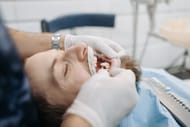Tooth pain can be an unwelcome and distressing experience, especially when it strikes as soon as you wake up. This discomfort can vary from mild sensitivity to intense throbbing pain, leaving you wondering about the underlying causes.
In this article, we will delve into the reasons behind toothache upon waking up and explore potential solutions to alleviate it.
Morning tooth pain: A common concern
Morning tooth pain is a common issue that many individuals experience at some point in their lives. It's characterized by aching, sensitivity, or sharp pain in one or more teeth immediately upon waking up.
While the causes of this pain can vary, understanding the factors involved can help you address the issue effectively.
Teeth hurt in the morning: Exploring the causes and solutions
Bruxism: One of the leading causes of morning toothache is bruxism, a condition characterized by the unconscious grinding or clenching of teeth during sleep. Bruxism can exert excessive pressure on the teeth, leading to enamel wear, microfractures, and even tooth sensitivity. Over time, this habitual grinding can result in morning tooth pain that gradually worsens.
Acid Reflux and Tooth Erosion: Acid reflux, a digestive disorder that causes stomach acid to flow back into the esophagus, can also contribute to morning toothache. The acid from the stomach can reach the mouth, leading to enamel erosion and tooth sensitivity. Individuals with acid reflux often find that their tooth pain is most prominent in the morning due to prolonged exposure to stomach acid during sleep.

Sinus Congestion and Tooth Sensation: Surprisingly, sinus issues can also lead to tooth pain upon waking up. The maxillary sinuses are located close to the upper teeth, and when they become congested or infected, the pressure can cause referred pain to the teeth. This sensation is often mistaken for toothache, making it important to differentiate between dental and sinus-related pain.
Gum Recession and Nerve Exposure: Receding gums can expose the tooth roots, which are not as well-protected as the enamel-covered crowns. When these roots are exposed, they can become sensitive to temperature changes, leading to pain, particularly in the morning when you breathe in cold air. Proper oral hygiene and regular dental check-ups are crucial for preventing gum recession and subsequent tooth sensitivity.
Cavity Formation and Toothache: Cavities, also known as dental caries, can cause significant morning tooth pain. Bacteria in the mouth produce acids that gradually erode the tooth's enamel, leading to the formation of cavities. These cavities can expose the tooth's inner layers, including the sensitive pulp, resulting in sharp pain and sensitivity, especially in the morning when your mouth is dry.
Addressing morning tooth pain: Tips and strategies
If you're experiencing morning tooth pain, there are several steps you can take to find relief:
- Maintain good oral hygiene: Brush and floss regularly to prevent cavities and gum disease.
- Use a night guard: If bruxism is the culprit, a night guard can help protect your teeth from grinding.
- Manage acid reflux: Consult a healthcare professional to manage acid reflux effectively.
- Stay hydrated: Keeping your mouth moist can reduce tooth sensitivity.
- Practice sinus care: Manage sinus congestion through appropriate treatments.

When to seek professional help
While mild morning toothache can sometimes be managed at home, there are instances when professional dental care is necessary.
If your toothache is severe, persistent, or accompanied by other symptoms such as swelling, fever, or discharge, it's crucial to consult a dentist. They can accurately diagnose the underlying cause and recommend appropriate treatment.
Morning tooth pain can disrupt your daily routine and affect your overall well-being. Understanding the various factors that contribute to this pain is essential for addressing the issue effectively.
Whether it's bruxism, acid reflux, sinus problems, gum recession, or cavities, taking proactive steps to maintain oral health and seeking professional guidance when needed can help you wake up pain-free and ready to face the day.
